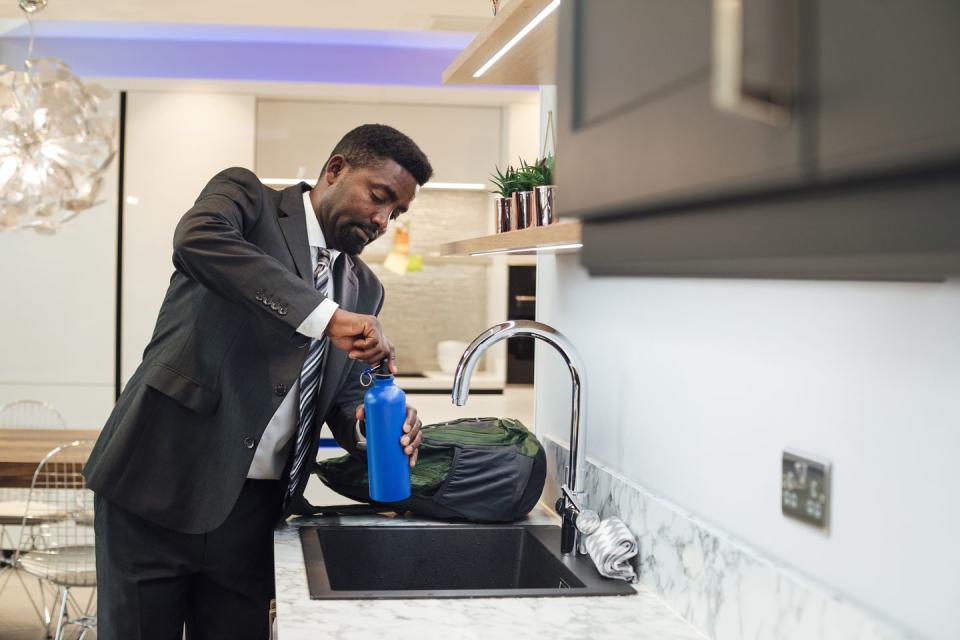The Key Health Differences Between Tap and Bottled Water
There have long been concerns about unsafe drinking water, which include the prevalence of lead, chromium-6, and even disinfectant products.
But you could argue that no event in the last 20 years more forcefully thrust the issue of water contamination into the forefront of the public consciousness than the Flint Water Crisis.
After the city of Flint switched its water supply from Detroit's public water system to the Flint River in 2014, the decision resulted in a severe outbreak of Legionnaires' disease and dangerously high levels of lead in the population.
Flint also may have had you wondering: "Just how safe is my tap water?"
And maybe even: "Should I be drinking bottled water instead?"
The answer, however, isn't simple—and it depends on a whole host of environmental, financial, geographical, and sociological factors. Where you live, who supplies your water, how much disposable income you have, and what kind of access you have are all important considerations when determining whether you should drink tap or bottled water.
And, listen, consuming water is important.

That's because even minor dehydration reduces the amount of fluid circulating in your bloodstream, which forces your heart to work harder, limits your body’s ability to cool itself, and prematurely fatigues your muscles. And your brain can suffer cognitive effects too.
Water is the best way to stay hydrated for your overall health because it contains no calories.
So if it's a really good idea to drink water, but you're struggling with where your water should come from, help has arrived.
Here, a few experts weigh in.
What is the Difference Between Tap and Bottled Water?
Tap water is the water that comes out of your faucet. “Tap (or municipal) water is regulated by the United States Environmental Protection Agency (EPA) but they only set regulations, as they are not the water supplier. The EPA sets standards for about 90 different potential contaminants in tap water,” says Cynthia Sass, M.P.H., R.D., an LA-based performance nutritionist and public health expert.
Bottled water, by comparison, is considered a food product. Therefore, it is regulated by the Food & Drug Administration (FDA) rather than the EPA. In addition, some state governments have established regulations that govern the quality of bottled water produced and sold within their state.

“The FDA has established Standards of Identity for bottled water products sold in the U.S. Basically, that means a water must meet certain definitions in order to be identified by a specific name, such as spring water, purified water, and mineral water,” says Sass.
You can easily get information about your local water supply and learn about their treatment system as well as what contaminants may be present.
“Places like Lowe's and Home Depot offer more detailed home water assessments, but chatting with people locally who have paid for these services already can also clue you in to what you're likely getting out of your tap, too,” says nutrition professor and dietitian, Kelly Jones M.S., R.D., C.S.S.D, who teaches a variety of medical and public health students.
Is Tap or Bottled Water Better or Safer for You?
It depends on what you're assessing.

“There are environmental concerns about bottled water, including the use of plastic and the large amounts of emissions generated in the transportation of bottled water,” says Sass. “There are also considerations regarding potential contaminants in water, which can vary between tap and bottled,” she says. So it comes down to brands of bottled water and the location of the tap water, too.
“There are also other considerations, like where you live, what percentage of your overall water intake comes from tap or bottled, the type of bottled water, what it's bottled in container-wise, how much it costs, and more,” says Sass. These things will factor into the quality of the tap water and how well a bottled water preference or habit could even fit into your lifestyle.
Plus, there might be benefits for your teeth. “Some people claim there is a large benefit to fluoride treatment in tap water to prevent cavities, but this is not utilized everywhere,” says Jones. “For example, where I live in Pennsylvania, water is not treated with fluoride. Most people also have fluoride in their toothpaste and maybe even mouthwash, and too much can also be harmful,” she adds.

There are some cases where tap isn’t better, though. “Some towns may also have their water easily contaminated by fracking and sadly even runoff from factory farms at times,” she adds.
If that's the case, you should go with bottled, Jones says. “If you live in these areas, I not only recommend bottled water, but also to have a water filtration installed in your home even to reduce contamination while showering and washing clothes,” she says.
The Bottom Line on Tap Versus Bottled Water
“I generally recommend drinking tap water that has been filtered through an NSF-certified water filtering pitcher to further reduce potential contaminants,” says Sass.
The filtering process keeps it clean (filters are not costly and you can keep it in the fridge for re-filling use) and cuts back on excess purchasing you’d expect from a bottled water habit.
Jones agrees, saying, “Due to environmental reasons as well as the BPA and phthalates that are in plastic water bottles, in this case, opt for the tap,” and recommends a Brita to keep in the fridge.
If you happen to be the type that refills large glass containers at Whole Foods and other specialty markets, and the price tag doesn't bother you, the mineral content over time may have a small benefit to health, Jones says, but it’s not drastic.
You Might Also Like
